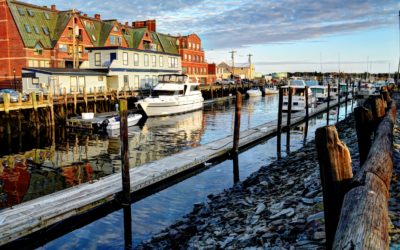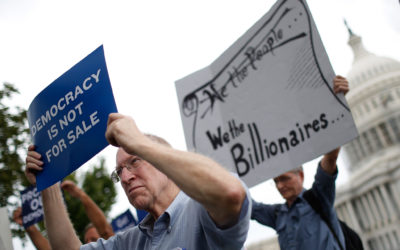AGAINST SUPERPACS
OUR PLAN TO GET SUPERPAC MONEY OUT OF POLITICS
tl;dr
We’ve got a strategy to get the Supreme Court to finally correct the legal error that gave us the most poisonous, polarizing and consequential money in American politics — the money from SuperPACs. An initiative on Maine’s 2024 ballot will tee the issue up. When it passes in November, we will have a path to ending this scourge.
Join us!
THE LEGAL BACKGROUND
Since 2010, when the D.C. Circuit Court of Appeals decided SpeechNow v. FEC, courts have held that the First Amendment bans any regulation of contributions to independent political action committees. Those decisions created the SuperPAC.
The Supreme Court has never reviewed this holding. When it does, the Supreme Court will reverse it.
The D.C. Circuit’s conclusion— that because independent spending could not risk quid pro quo corruption, contributions to independent spending committees could not risk quid pro quo corruption — is obviously wrong, as a matter of logic and actual fact.
The clearest case demonstrating the error was United States v. Robert Menendez (2015).
Menendez was charged criminally with engaging in a bribe — a quid pro quo: governmental favors were offered, it was alleged, in exchange for a contribution to Menendez’s SuperPAC.
Though the jury did not convict, the critical point is this: The thing the DC Circuit said was logically not possible — that a contribution to a SuperPAC could involve a quid pro quo corruption — was plainly possible! Contributions to SuperPACs thus raise a risk of quid-pro-quo corruption. Under the principles of Citizens United v. FEC (2010), they should plainly be regulable.
That’s why we believe that when the Supreme Court gets a chance to review this mistake — finally, after 14 years! — it will correct it, giving states and the federal government the power to limit contributions to independent political action committees.
Or in other words, when the Supreme Court gets the chance, it will end SuperPACs.
This conclusion rests not on any aspirational theory of the First Amendment or any new doctrine of campaign finance law. It is a direct application of the existing law governing campaign finance regulation. If the Court applies the test they say should be applied, SuperPACs will end.
Senator Josh Hawley has suggested a second ground on which to uphold limitations on contributions to SuperPACs — the conservative theory for interpreting the Constitution, “originalism.”
As Hawley argued when introducing a bill to reverse Citizens United, the original meaning of the Constitution would plainly permit the regulation of corporate spending.
That same theory of originalism would also support limitations on contributions to SuperPACs.
And if you don’t believe us, just read the Wall Street Journal’s frantic effort to deny that originalism gives government the power to end corporate corruption of our government A pig doesn’t squeal unless it’s been stuck!
THE LEGAL BACKGROUND
WHAT WE’RE DOING?
WHAT WE’RE DOING?
Equal Citizens has been working for years to get this issue before the Supreme Court, so that the Supreme Court can reverse this awful mistake.
In 2018, we tried to get Alaska courts to recognize the mistake in SpeechNow. The lower court agreed with us; the Alaska Supreme Court did not.
In 2022, working with FreeSpeechForPeople.org, we tried to get an initiative in Massachusetts to block contributions to SuperPACs. The Attorney General blocked our initiative, and the SJC said we had to gather signatures before they would review the AG’s decision.
Then in 2023, building on the powerful argument FreeSpeechForPeople.org made, we launched a video competition to try to make obvious exactly why the lower courts (and the Attorney General of MA) were missing. (You can view our winning entries here.)
And then in August 2023, we began working with citizens in Maine to explore an initiative in Maine to block contributions to SuperPACs.
- Those citizens started the ballot question committee, Maine Citizens to End SuperPACs.
- EqualCitizens.US then raised the funds to gather the signatures to get that initiative on the ballot.
- Those signatures have now been gathered. In January, they will be presented to the Maine Secretary of State.
- So that in November 2024, Maine will vote on whether to limit contributions to SuperPACs.
We are confident that the when Mainers decide the question, the state that voted to block foreign money in its elections with more than 85% support will also vote to block big money in its elections.
WHAT WOULD HAPPEN THEN
When Maine passes its anti-SuperPAC initiative in November 2024, the law will be challenged (and most likely stayed from enforcement during the litigation).
That challenge will likely happen the federal district court in Maine.
The district court will likely rule quickly on this important initiative's constitutionality.
Whatever the outcome, the decision will be appealed to the First Circuit Court of Appeals.
The First Circuit has not yet ruled on whether SpeechNow is correct. It will, therefore, have a chance to consider the matter without the burden of prior precedent.
If Maine prevails in the First Circuit, then the United States Supreme Court will certainly take the case up.
And if things move quickly, then by July 2026 — the 250th anniversary of the Declaration of Independence — the Supreme Court will either declare us free of SuperPACs or give us yet another reason for a (peaceful) revolution in constitutional law (through amendments! See the great work of American Promise).
WHAT WOULD HAPPEN THEN
HOW WE FUND THIS WORK
HOW WE FUND THIS WORK
We recognized that it was going to be difficult to raise the $1 million it was going to take to get this initiative on the ballot.
So we determined to raise this money from the very people who would be affected most by this initiative — the super wealthy, who use SuperPACs to influence public policy.
Our aim now is to recruit as many of those super wealthy as we can to commit to support this effort to reduce their influence in American politics.
This is something rare, but important, in American politics:
Powerful people demanding that legislatures and the people be allowed the power to limit the influence of powerful people in politics.
We want them to say, through their wallet and their words:
We demand the same influence in politics that everyone else has — which is to say much less than we have now!
WHAT YOU CAN DO NOW?
If you’re among the few most privileged in America, and want to join this pledge, reach out to Lessig here.
If you’re among the many in America who want a politics in which our government is, as James Madison promised, “dependent on the people alone,” where “the people” he meant “not the rich more than the poor,” then help Maine pass this anti-SuperPAC initiative.
- Contribute to Maine’s CitizensToEndSuperPACs.org.
- Join our list to be kept in the loop.
- Share this page with your 10,000 best friends — including your 50 most favorite billionaires!
Because in American, when 50 billionaires stand behind an idea, there’s a really really good chance it will happen. And if the people agree with them, that at least can’t hurt.
It is time to reverse this mistake, and end this corruption in American politics.
Let us make this critically important idea happen now.
WHAT YOU CAN DO NOW
RECENT NEWS AND RESOURCES
LEARN MORE ABOUT THE STRATEGY AGAINST SUPERPACS
ALASKA LEGAL FILINGS
- Petition for a Writ of Certiorari – December 2, 2021
- Alaska Supreme Court Decision – September 3, 2021
- Equal Citizens Alaska Supreme Court response brief – September 2, 2020
- APOC Alaska Supreme Court opening brief – June 11, 2020
- Superior Court Order – November 4, 2019
- Reply Brief of Appellants – February 26, 2019
- Brief of Appellee– January 30, 2019
- Brief of Appellants– November 16, 2018
- Expert Report of Adam Bonica
– Entered into evidence on October 4, 2018 - Expert Report of Jack Rakove – Entered into evidence on October 4, 2018
- Statement of Point on Appeal – March 30, 2018
- Notice of Appeal – March 30, 2018
- Complaint – Patrick v. Interior Voters for John Coghill and Working Families, January 31, 2018
- Complaint – Lambert v. Interior Voters for John Coghill and Working Families, January 31, 2018
- Complaint – Barnett v. Interior Voters for John Coghill and Working Families, January 31, 2018
- Case Description Form
MAINE LEGAL FILINGS (COMING SOON)


